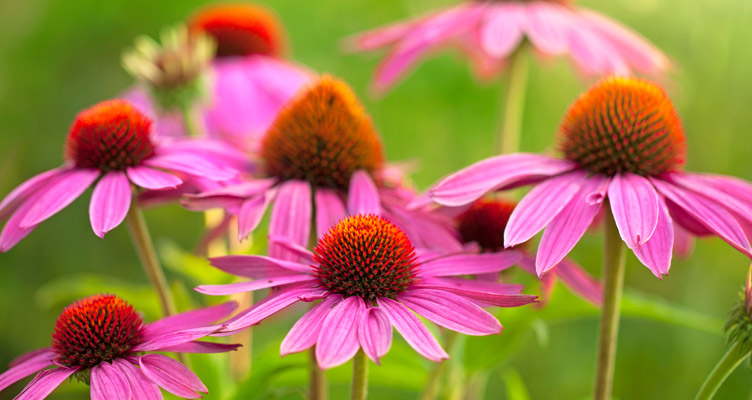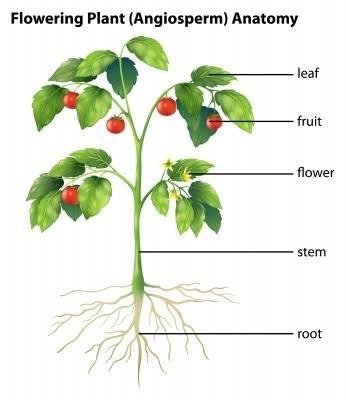Supplements #1: Echinacea
When I was visiting family over the winter holidays I noticed that one of them was taking Echinacea as a supplement. Being unfamiliar with Echinacea I asked what it was for and I was told it was to prevent the common cold. I admit that it sounds great. You take an extract of a flower, it boosts your immune system, and the chance of getting a cold goes way down. However, sooner or later the scientist in my head comes out and wants to how the supplement works, which pathways in our body are affected, what is the dose-response, etc. Therefore, let’s take a look at the science behind the purple coneflower: Echinacea.

Healthy benefits
Healing powers, medicinal benefits, or just a pretty flower? The science is actually not sure yet. Of the nine species that have been found all of them grow in eastern and central North-America. It is, therefore, no surprise that in these regions Echinacea has been used as a herbal medicine for centuries. Echinacea has recently become available as extracts, chewable, capsules, etc, on the North American and European market. But we aren’t even sure if, or how, it works. So let’s take a look at studies investigating the effect of Echinacea.
- A study by Linde et al. (2006) compared the effect of different variations of the family Compositae, which is the family Echinacea belongs to. They argue that consumers and physicians are unaware that products claiming to contain Echinacea actually have quite different compositions. The composition depends on the type of plant material used and the method of extraction.
The researchers compared several varieties of Echinacea, a placebo, and other treatments of the common cold. In three cases comparing Echinacea with a placebo for prevention showed no difference. The other 16 comparisons of Echinacea with placebo resulted in 9 where Echinacea had a significant effect, one with a trend, and no difference in 6. The authors conclude that the aerial parts of the variety E. purpurea could serve as an early treatment in adults, although the results aren’t consistent (Figure 1).

Figure 1: The aerial parts of a plant are all that is above the ground, which is from the stem going up.
A meta-analysis by A Shah et al. (2007) compared 14 studies to determine the effect of Echinacea on incidence and duration of the common cold. Doing a statistical analysis resulted in the finding that Echinacea decreases the odds of the common cold by 58%, or, for the statisticians among us, with Echinacea the odds ratio for a common cold is 0.42; 95% CI 0.25-0.71. What this means is that in 95% of the cases taking Echinacea reduces the chance of common cold by between 25 – 71%. This is a high variation, but the previous article already suggested a reason: high variability in the composition of different Echinacea products. The duration of the cold was reduced by 1.4 days on average (weighted mean difference -1.44; 95% CI -2.24 to -0.64). This meta-analysis shows that taking any variation of Echinacea would be beneficial against the common cold.
Another study by Karsch-Volk was done with similar trails as performed by Linde et al. The authors did 24 trials with 4631 participants comparing 33 different Echinacea preparations with placebo. Prevention and treatment comparisons were done. Prevention comparisons showed no effect, however, when the results were pooled a risk reduction of ~15% was found. The treatment trials found a significant reduction of illness duration in 2 out of 6.
Side effects
Echinacea does not only have upsides. Although it was uncommon rashes were reported in one trial with children. The study by Karsch-Volk mentioned previously talks about patients dropping out of the trials. They only talk about the incidences of people dropping out, and there more dropping out in the treatment group. The reason they gave was adverse effects, which ones though? Some digging in the article and two articles by Huntely et al, (2005) and Mullins & Heddle (2002) suggest that the most relevant side effects are allergic reactions, although these are still rare. A placebo-controlled study on children by Taylor et al. (2003) found that a treatment with Echinacea increased the incidence of rash by 5%.
Conclusion
Having looked at the science that has been done on Echinacea we can conclude there that is no single study that can claim with confidence that Echinacea is beneficial against the common cold. Nonetheless, when multiple studies are pooled mild benefits in a decreased common cold incidence and duration are found. Therefore, if you are suffering from colds often it might be worth trying products with Echinacea. Just remember these things:
- There are different varieties of Echinacea, and different parts of the plant are used. Some will be more effective than others. The most beneficial seems to be products made from the aerial parts of E. purpurea.
- Don’t expect any miracles, taking any Echinacea product will only give a minor boost to your resistance against common cold.
- While it is rare, allergic reactions to Echinacea do occur. If you are taking Echinacea and don’t feel well you should see a doctor. Researchers of the adverse effect recommend that people with allergy or asthma carefully consider using Echinacea.

After making this post, I find these supplement analysis quite useful. I’d like to do more of these and can probably pick some interesting ones myself. However, I wanted to ask that if one of you has a suggestion for some supplement or healthy food to know more about then I would like to give that higher priority. Steem on!
References:
WebMD - Echinacea
Echinacea for the Common Cold
Images:
Flower
Unsplash
Aerial parts
Recently from @Altherion
Paper discussion #3 - A prevention for cancer?
The Farmer's Friend
Urban Farming
by FoodLabScience
Twitter

A scientist’s food for thought!
Guess i will stop trim the lawn and put it on the plate instead. Its a follow! Getting my masters in food technology next semester! Looking forward to your future posts!
Nice! You're almost there. Good luck in the last parts of your study.
Nice article Mr./Ms. @altherion, I like that you included confidence intervals, I didnt know about the properties of this plant. Followed and upvoted.
I think you would like my blog, Im conducting a simple investigation to reverse DM2, if you have time you can go there and read a little about it :)
It is Mr. @altherion :).
I'll go and take a look, ty for the suggestion.
this is great.
indeed you are a food technologist.
wish you could help me more on food tech.
Thank you @pekkypatyy. My plan is to post more of these supplements analysis, so expect more to come.
Vitamins and supplements provide great value
I love your work, I am also a photographer. I post daily blogs from around the world. Give me a follow ! Upvoted!
Thanks @michael-maresca, I'll check out your blog.
Everything a person needs can be taken from nature and herbal supplements - this is the simplest and best solution that exists. I like that these are all natural products or oils that help with various diseases, problems or vitamin deficiencies. For example, the website https://secrets.shop/ is a good place to find what you need